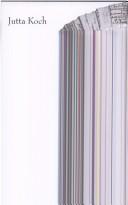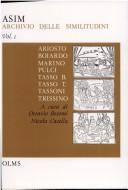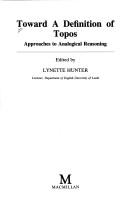| Listing 1 - 10 of 14 | << page >> |
Sort by
|

ISBN: 9783826035883 Year: 2007 Publisher: Würzburg : Königshausen und Neumann,
Abstract | Keywords | Export | Availability | Bookmark
 Loading...
Loading...Choose an application
- Reference Manager
- EndNote
- RefWorks (Direct export to RefWorks)
Book
ISBN: 080477336X 9780804773362 9780804762076 9780804762083 Year: 2009 Publisher: Stanford, Calif. Stanford University Press
Abstract | Keywords | Export | Availability | Bookmark
 Loading...
Loading...Choose an application
- Reference Manager
- EndNote
- RefWorks (Direct export to RefWorks)
What is a woman? What is a man? How do they—and how should they—relate to each other? Does our yearning for "wholeness" refer to something real, and if there is a Whole, what is it, and why do we feel so estranged from it? For centuries now, art and literature have increasingly valorized uniqueness and self-sufficiency. The theoreticians who loom so large within contemporary thought also privilege difference over similarity. Silverman reminds us that this is but half the story, and a dangerous half at that, for if we are all individuals, we are doomed to be rivals and enemies. A much older story, one that prevailed through the early modern era, held that likeness or resemblance was what organized the universe, and that everything emerges out of the same flesh. Silverman shows that analogy, so discredited by much of twentieth-century thought, offers a much more promising view of human relations. In the West, the emblematic story of turning away is that of Orpheus and Eurydice, and the heroes of Silverman's sweeping new reading of nineteenth- and twentieth-century culture, the modern heirs to the old, analogical view of the world, also gravitate to this myth. They embrace the correspondences that bind Orpheus to Eurydice and acknowledge their kinship with others past and present. The first half of this book assembles a cast of characters not usually brought together: Friedrich Nietzsche, Sigmund Freud, Marcel Proust, Lou-Andréas Salomé, Romain Rolland, Rainer Maria Rilke, Wilhelm Jensen, and Paula Modersohn-Becker. The second half is devoted to three contemporary artists, whose works we see in a moving new light:Terrence Malick, James Coleman, and Gerhard Richter.
Analogy in literature. --- Resemblance (Philosophy) in literature. --- Ontology in literature. --- Art, Modern --- Philosophy. --- Orpheus --- In literature. --- Analogy in literature --- Ontology in literature --- Orpheus (Greek mythology) in literature --- Resemblance (Philosophy) in literature --- Philosophy --- Orpheus (Greek mythology) in literature.
Book
ISBN: 9780804762076 9780804762083 Year: 2009 Publisher: Chicago Stanford University Press
Abstract | Keywords | Export | Availability | Bookmark
 Loading...
Loading...Choose an application
- Reference Manager
- EndNote
- RefWorks (Direct export to RefWorks)
Book
ISBN: 0571094740 9780571094745 Year: 1970 Publisher: London: Faber and Faber,
Abstract | Keywords | Export | Availability | Bookmark
 Loading...
Loading...Choose an application
- Reference Manager
- EndNote
- RefWorks (Direct export to RefWorks)
Book
ISBN: 9782406057970 Year: 2016 Publisher: Paris : Classiques Garnier,
Abstract | Keywords | Export | Availability | Bookmark
 Loading...
Loading...Choose an application
- Reference Manager
- EndNote
- RefWorks (Direct export to RefWorks)
Ces études refusent la réduction de l'analogie à un processus pré-scientifique ou a-logique. Elles proposent une réflexion sur l'analogie comme démarche intellectuelle originale et repensent sa force heuristique suivant différentes perspectives aristotéliciennes développées au XXe siècle. ©Electre 2016
Book
ISBN: 0823272826 082327280X 0823272818 082327277X Year: 2017 Publisher: New York, NY : Fordham University Press,
Abstract | Keywords | Export | Availability | Bookmark
 Loading...
Loading...Choose an application
- Reference Manager
- EndNote
- RefWorks (Direct export to RefWorks)
Light figures being; darkness, death. Bridging mathematical science, semantics, rhetoric, grammar, and major poems, Judith H. Anderson seeks to negotiate writings from multiple disciplines in the shared terms of poiesis and figuration rather than as cultural opposites. Analogy, a type of metaphor, has always been the connector of the known to the unknown, the sensible to the infinite. Anderson’s study moves from the figuration of light and death to the history of analogy and its pertinence to light in physics and metaphysics, from Kepler to Donne, Spenser, and Milton. Topics proliferate: creativity, optics, the relation of literature to science, the methodology of thought and argument, and the processes of narrative, discovery, and interpretation.
Allegory. --- Analogy in literature. --- Metaphor in literature. --- Death in literature. --- English literature --- History and criticism. --- Analogy. --- Death. --- Donne. --- Kepler. --- Light. --- Literature and science. --- Milton. --- Optics. --- Spenser. --- metaphor.
Book
ISSN: 2103480X ISBN: 9782812410499 9782812410505 2812410507 2812410493 Year: 2013 Volume: 21 1 Publisher: Paris: Classiques Garnier,
Abstract | Keywords | Export | Availability | Bookmark
 Loading...
Loading...Choose an application
- Reference Manager
- EndNote
- RefWorks (Direct export to RefWorks)
Cet ouvrage est consacré à Perrudja d'Hans Henny Jahnn, The Wild Palms / If I Forget Thee, Jerusalem de William Faulkner, Orion aveugle / Les Corps conducteurs, Triptyque et Leçon de choses de Claude Simon. Il s'intéresse aux résurgences romanesques d'un processus de pensée ancien, oublié, voire réprouvé, l'analogie, dont il s'efforce de préciser les fonctions dans le champ que dessinent ces romans, mais aussi les modes de pensée et les processus psychiques sous-jacents. La réflexion définit ainsi les caractéristiques logiques et esthétiques du roman analogique, qui conjugue attrait inextinguible pour le continu, reconnaissance des discontinuités et effort pour passer outre
Comparative literature --- Jahnn, Hans Henny --- Simon, Claude --- Faulkner, William --- Comparative literature. --- Analogy in literature. --- Littérature comparée --- Analogie dans la littérature --- Jahnn, Hans Henny, --- Faulkner, William, --- Criticism and interpretation. --- Littérature comparée --- Analogie dans la littérature --- Comparative Literature --- Analogy in literature --- Criticism and interpretation --- Jahnn, Hans Henny, - 1894-1959. - Perrudja --- Faulkner, William, - 1897-1962. - Wild palms (Novel) --- Simon, Claude - Criticism and interpretation
Book
ISBN: 9782812406294 2812406291 9782406155737 2406155730 Year: 2012 Volume: 29 Publisher: Paris: Classiques Garnier,
Abstract | Keywords | Export | Availability | Bookmark
 Loading...
Loading...Choose an application
- Reference Manager
- EndNote
- RefWorks (Direct export to RefWorks)
Quel rôle jouent l'analogie et ses figures dans la promotion du récit de voyage, entre Lumières et romantisme ? Mises au service de la vocation informative attribuée à celui-ci par la tradition, elles se font, dès la fin du xviiie siècle, le véhicule d'une connaissance d'un type nouveau et contribuent à «l'entrée en littérature» du genre viatique. L'ouvrage s'attache à retracer cette évolution en un parcours où se croisent rhétorique, histoire de la littérature, des idées et des sciences.
French literature --- Travelers' writings, French --- Analogy in literature. --- Travel in literature. --- Littérature française --- Ecrits de voyageurs français --- Analogie dans la littérature --- Voyage dans la littérature --- History and criticism. --- Histoire et critique --- Analogy in literature --- Travel in literature --- History and criticism --- Récits de voyages --- Voyages --- Dans la littérature --- Littérature française --- Ecrits de voyageurs français --- Analogie dans la littérature --- Voyage dans la littérature --- Histoire et critique. --- Dans la littérature. --- Travelers' writings, French - History and criticism --- French literature - 19th century - History and criticism

ISBN: 3487097958 Year: 1994 Publisher: Hildesheim : G. Olms,
Abstract | Keywords | Export | Availability | Bookmark
 Loading...
Loading...Choose an application
- Reference Manager
- EndNote
- RefWorks (Direct export to RefWorks)
Epic poetry, Italian --- Romances, Italian --- Simile. --- Analogy in literature. --- Poésie épique italienne --- Roman courtois italien --- Comparaison (Rhétorique) --- Analogie dans la littérature --- Concordances --- Concordances. --- Italian language --- Italian literature --- Synonyms and antonyms --- History and criticism. --- Poésie épique italienne --- Comparaison (Rhétorique) --- Analogie dans la littérature

ISBN: 0333523539 Year: 1991 Publisher: Basingstoke Macmillan
Abstract | Keywords | Export | Availability | Bookmark
 Loading...
Loading...Choose an application
- Reference Manager
- EndNote
- RefWorks (Direct export to RefWorks)
Comparative literature --- Thematology --- English language --- French language --- English literature --- Anglais (Langue) --- Français (Langue) --- Littérature anglaise --- Terms and phrases --- History and criticism --- Mots et locutions --- Histoire et critique --- -Place (Philosophy) in literature --- Setting (Literature) --- Analogy in literature --- Reasoning in literature --- Place (Literature) --- Authorship --- Drama --- Fiction --- Literature --- British literature --- Inklings (Group of writers) --- Nonsense Club (Group of writers) --- Order of the Fancy (Group of writers) --- Technique --- Français (Langue) --- Littérature anglaise --- Place (Philosophy) in literature
| Listing 1 - 10 of 14 | << page >> |
Sort by
|

 Search
Search Feedback
Feedback About UniCat
About UniCat  Help
Help News
News